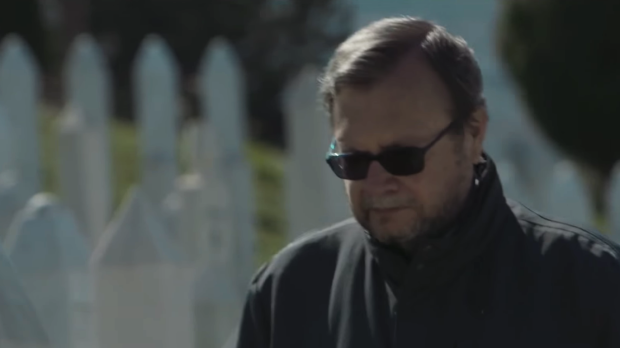On a day in 1993, Vito Alfieri Fontana was in the car with his son. On the back seat were some brochures describing the anti-personnel and anti-tank mines produced by the family business, Tecnovar.
His 10-year-old son asked him what the mines were. “I explained it to him,” Vito recalls. “Then you’re a murderer,” was his son’s response. “Then, as if regretting his words, ‘Dad, I understand that everyone can make weapons, but why you?’ From that moment, giving my son an answer has been the real problem of my life. Because it’s a simple question, but it moves a mountain inside you.” (Vanity Fair, January 7).
Tecnovar’s mines were high quality, and Vito, a trained engineer, had taken over the helm of the family business founded by his father. He used his knowledge to continue producing mines that were “easy to camouflage, weatherproof, and ruthless,” as described by an article in Avvenire.
“We were selling them to governments.”
The arms industry benefits from war; in this case, the Yom Kippur War between Israel, Egypt and Syria led to increased mine sales in 1973, when “the great powers were competing to replenish their arsenal,” Avvenire reports. “We were selling them to governments. We were not traffickers,” Vito explained to the Italian news outlet.
However, as he later realized, he had no control over where the weapons ended up after they were delivered. “Devices sent, for example, to the Egyptian Army ended up being passed on to a Balkan militia or who knows where,” Avvenire explains.
Venerable Tonino Bello
Then in 1991 Vito’s world changed forever. The first person to make him change his life was Bishop Tonino Bello, who was declared venerable on November 25, 2021. “For us, he was a saint even before,” Vito told Avvenire.
“He sought me out to ‘find common ground for discussion together.’ He said just that.” In 1993, the venerable bishop invited Vito to a public meeting to discuss the controversial industry. Unfortunately, Bishop Tonino died of cancer before the event in which he had intended to participate. Vito didn’t back down, although he ended up being the only representative of the arms industry present at the meeting.
“The audience was furious with me,” he told Avvenire reporter Nello Scavo. He wasn’t surprised, and as his personal conversion on the issue was already underway, he didn’t try to excuse himself.
His son’s question
A couple of years later, Fontana closed the family business he had inherited from his father. After his contact with Venerable bishop Tonino, the conversation with his 10-year-old son, who asked him “So you’re a murderer?” was decisive.
From making and selling mines to removing them
Vito felt he could no longer continue producing mines. After looking at his options, he decided to close the business, although he waited until he could ensure that his employees had other employment lined up, Avvenire reports. Vito had his wife’s support, which was very important for him. It was not an easy decision. He told Vanity Fair that his family saw it as a betrayal, and his industry colleagues didn’t understand it either:
You’re viewed with suspicion by both the environment you left, the weapons manufacturers, and the one you are joining, the deminers. It was a heartbreaking decision on many levels. First of all, you have to understand that there was a whole family, I’m not talking about my wife and children, but about a dozen relatives, who lived off of that business, and lived well.
He didn’t just want to stop causing more damage, though; he wanted to make things right. He collaborated in the drafting of the Ottawa Convention signed in 1997 for the prohibition of anti-personnel mines. Then, he offered himself to work as a deminer in the former Yugoslavia.
His trip to the Balkans
This was truly an eye-opening experience for him. He had always seen mines from the perspective of an engineer and businessman; in the Balkans, he saw how they were used with incredible malice against innocent civilians, refugees in a land devastated by war.
From 1999 to 2012, he worked with the humanitarian organization Intersos carrying out mine clearance in Bosnia, Vanity Fair reports. “We found devices connected to the electricity of abandoned houses, to target refugees who would return after the war.”
The rosary
When Vito and his team had gone to clean up in a particular Serbian village, Avvenire reports, they discovered that not a single ordnance had actually been buried, “but fear had prevented Catholics from returning to their homes.” They checked all the usual places for mines—abandoned homes, bombed churches, fields—but they found no mines. Instead, they found a rosary. “That rosary was there to tell us that while we had all fled, He had remained there,” Vito said.



